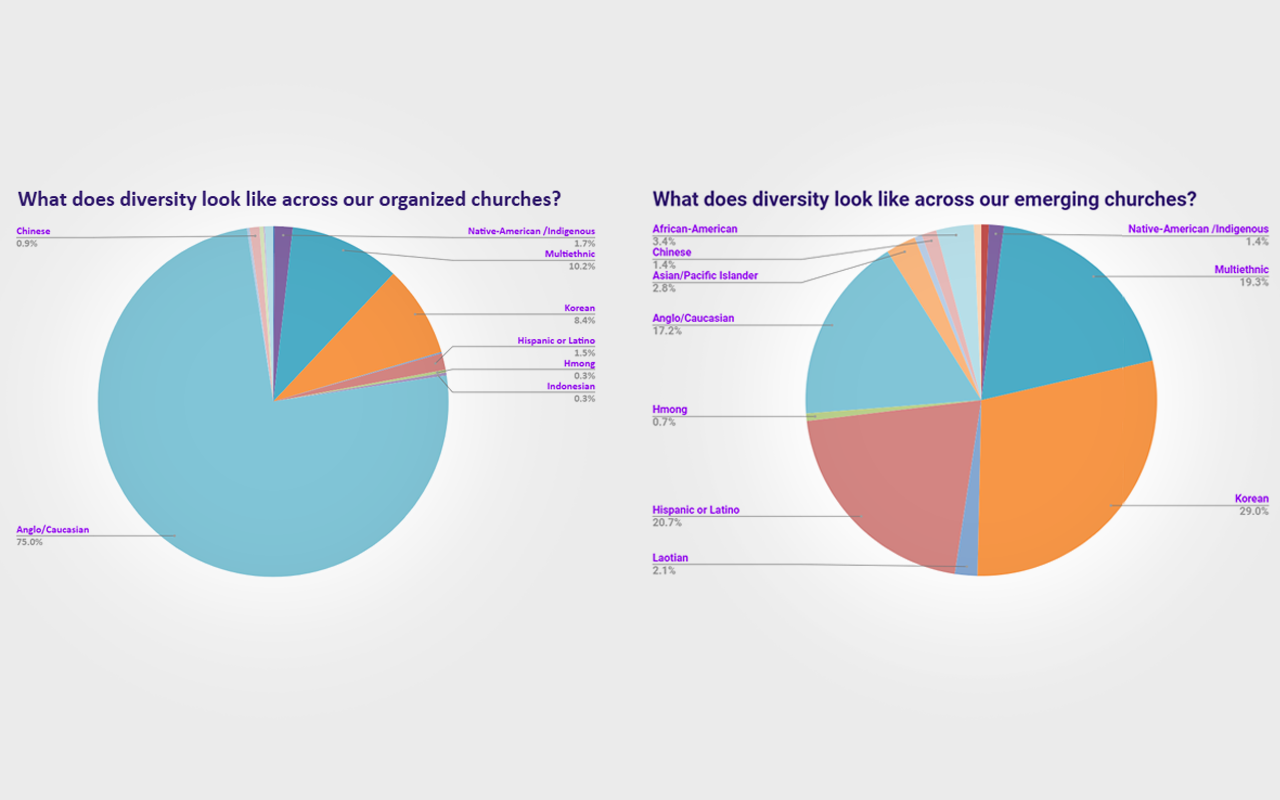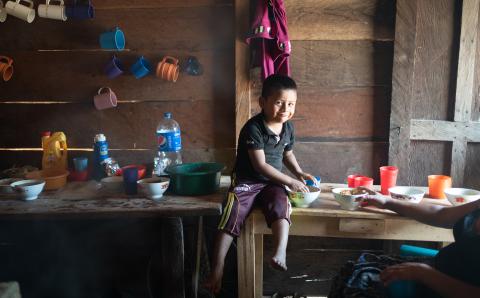The Council of Delegates of the Christian Reformed Church in North America, including eight new members and one just-appointed interim delegate, met Oct. 8-10 at Cascade Fellowship Christian Reformed Church in Grand Rapids, Mich.
The Council is made up of delegates appointed by synod from each of the 49 classes (regional assemblies) of the CRC and up to 10 at-large members who serve up to two three-year terms. It meets three times a year to serve as the denomination’s ecclesiastical governance body, acting on behalf of synod, the CRC’s broadest assembly.
In May the Council approved forming a new advisory committee for Diaspora and Ethnic Ministry, hoping to “listen to the perspectives of CRCNA members and leaders of different ethnic cultural backgrounds about their engagement within our denomination’s ecclesiastical system and advise the Council of Delegates and its committees on policies and activities that will increase participation.”
This is the growing edge of the Christian Reformed Church, with 82.8% of emerging churches (yearbook data as of September 2025) identifying themselves as “multiethnic” (19.3%) or a specific ethnicity other than “Caucasian/Anglo.” Those percentages flip for organized churches—75% of those identify as “Caucasian/Anglo” in the yearbook survey data; 10.2% multiethnic; 8.4% Korean; and the other 6.5% one of 11 different ethnic identity categories, including Native American/Indigenous, Hispanic/Latino, Chinese, African-American, and Filipino. Andre Van Ryk, the Council of Delegates’ vice president; Linda Van Sligtenhorst, from the Council’s governance committee; Debra Jallim, from the Resonate Global Mission committee; Christian Pederson, from the ReFrame Ministries committee; Doug Fakkema, from the Thrive committee; and Rachel Bouwkamp, from the synodical service committee, will all serve on the inaugural Diaspora and Ethnic Ministry committee, which is expected to meet at least twice in the 2025-26 ministry year. General secretary Zach King, who is an ex officio member of the committee, said they would try to convene within the next couple of months. According to what was decided in May, King is to invite a slate of up to six guests “from among the preceding year’s synodical delegates who represent the diversity of the CRCNA from the United States and Canada” who will provide the needed feedback to the Diaspora and Ethnic Ministry committee.
The Council of Delegates revisited an updated report from its task force to address governance costs. At a special video conference meeting in September, the Council accepted two of the task force’s three proposals to pass on to Synod 2026 for consideration. The task force presented one revised recommendation at the October meeting, which the Council accepted. The task force was dismissed with thanks, and the final report will be included in the Agenda for Synod 2026 with the following recommendations: “that synod meet on a biennial basis—every two years—beginning in 2027” with specific provision for changes “to the candidacy process, the process for approving key denominational leadership, and other matters that are currently handled by synod annually”; that the Council of Delegates “draw attention to the costs of synod and Council of Delegates meetings—transportation, food, lodging, venue—and … encourage classes to consider payments to the denomination as they are able to help offset those costs”; and that “synod establish a one-year task force, working in close coordination with the classes, to review the current classis structure and make recommendations to Synod 2027 for classis consolidations and/or overall restructuring.”
The Council of Delegates also wants synod to note Thrive’s completion of materials to support congregations and classes navigating various aspects of ministerial release from service; a request to add a paragraph to the Guide for Conducting Church Visiting that identifies “church visitors’ role in situations where conflict is present”; the suspension of the published index of synodical decisions—believing the ease of searching for and accessing past synodical decisions “can be accomplished today in (technological) ways that make better use of staff time and financial resources”; and a request to ratify amended articles of incorporation for the CRC Loan Fund that permit lending not only to congregations but also “to CRC-related organizations.” The Council accepted the amended articles “subject to the Loan Fund not closing a loan to a CRC-related organization until synodical approval.” Synod 2025 had authorized the Council of Delegates “to review and approve any amendments the Loan Fund board of directors proposes to its Article of Incorporation, stated purpose, and place in the CRC denominational structure.” The Loan Fund is a separate entity operating exclusively in the U.S. and reporting its activities to synod. Before that authority was granted in June the Fund’s Articles of Incorporation and bylaws did “not specify denominational oversight mechanisms for reviewing and updating its governing documents.”
The Council approved “Founded on God’s Faithfulness” as a guiding theme for prayer and worship for Synod 2026.
In preparation of having a vision, strategy, and financial proposal for church planting ready for Synod 2026, the Council of Delegates heard an update from Tim Sheridan, Resonate Global Mission’s director of church planting. Noting that “church planting is often the fruit of discipleship,” Sheridan said they want to center the conversation on discipleship and multiplication, suggesting to look upstream from church planting and ask, “‘What’s the plan to prepare and multiply leaders?’” Delegates contributed by working through reflection questions.
The Council heard reports from several ministries and ministry leaders, noting an upcoming opportunity in February to meet the new World Renew executive director-Canada, Peter Timmerman, expected to start Oct. 27; an anticipated search for a new director of ReFrame Ministries with the expected retirement of Kurt Selles in July 2026; a planned sabbatical for general secretary Zach King in July; and the culmination of a hiring process for a director of partnership administration, Roberta Vriesema. The Council of Delegates celebrated outgoing chief administrative officer Shirley De Vries, who anticipates retiring from her almost 44-year career with the Christian Reformed Church in January. Her first position with the denomination, a part-time secretarial role, started Jan. 18, 1982.
In her report to the October meeting De Vries outlined the changing demographics of the Christian Reformed Church, highlighting the culture change as more emerging churches reflect ethnic backgrounds other than the previously predominant “Caucasian/Anglo” and classes increasingly include churches with people of many backgrounds. Yearbook data as of September 2025 show “only three of 49 classes that have a single primary ethnicity defined,” De Vries said. Leaving the ecclesiastical leadership with many questions, she said: “Something new is being built. How do we embrace those changes? Who is at the table? Who should be at the table? How do we enable broad participation? What are the barriers? Are we developing leadership pipelines in the right places, with the right people, and in the right ways? How will we be a community of churches?
Ministry Boards
Dan DeKam, U.S. director of ministry operations, and Al Postma, executive director-Canada, met with their respective U.S. and Canadian ministry boards Oct. 9. One item of business on the U.S. side was authorizing Resonate’s director of operations, David Morgan, to sign paperwork necessary for the sale of six duplexes the agency owns in Grand Rapids. Morgan said the ministry had concluded to sell what used to be used as temporary housing for missionaries on home assignment for a combination of reasons including other opportunities for accommodating returning missionaries, and that repurposing to function as landlord-operated properties “is not the business we’re in.” The underused properties are being sold to an affordable housing firm, Morgan said.
Andre Van Ryk, chair of the Canada Ministry Board, noted a consensus from the Canadian board to have Postma work toward filling a director vacancy in the Centre for Public Dialogue, which has been left unfilled since founding director Mike Hogeterp left in 2023. Van Ryk mentioned that after Synod 2025 when synod recommitted to a binational denomination, the group Towards CRC Canada made clear its intentions to shape a new network or fellowship of Reformed churches in Canada. “As soon as you do that, we have to stop having conversations,” Van Ryk said of the denominational ministry board and this grass roots group. “So that has happened,” he continued. “They have their own conference in early November. We have not been invited; in fact, we’ve been told not to come. We don't know the uptake.”
The focus of Postma and the Canada Ministry Board continues to be transparent, supportive leadership tailored to the Canadian context. Van Ryk said they are still working on the agenda for the Canadian National Gathering, to be hosted at Redeemer University in Ancaster, Ont., in May—an opportunity every three years to “strategically celebrate, discern, and envision” ministry for the CRC in Canada locally, regionally, and nationally. In 2023 it met in Ottawa; in Edmonton in 2019; and in Waterloo, Ont., in 2016.
Postma and Van Ryk are co-hosting a conference call open to Canadians to hear first hand from members of the board ministry team about actions of the October meeting and ministry over the past year. “We want to hear your thoughts on the impact the CRC ministries have had, the stories of lives touched, and the ways we've collectively served God's kingdom,” Postma wrote in an invitation to Canadian churches. “This is also an opportunity to look forward together. As we reflect on the past, we also prayerfully consider the future—the opportunities, challenges, and the ways we can continue to grow and deepen our impact in the coming year.”
The next scheduled meetings of the Council of Delegates and the U.S. and Canadian ministry boards are Feb. 4-6, 2026, convening by video conference.
About the Author
Alissa Vernon is the news editor for The Banner.









